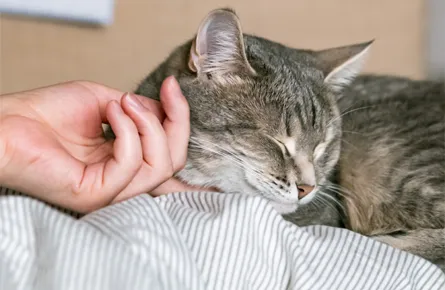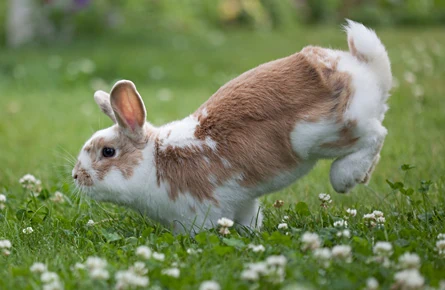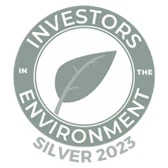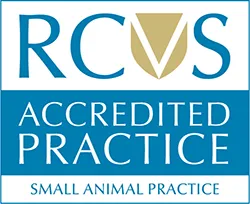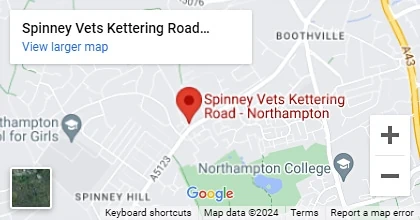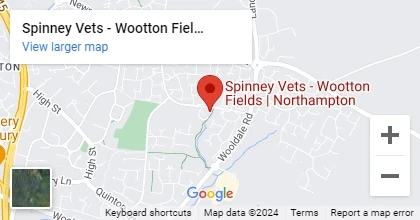Here at Spinney Vets, in Northampton, we provide the optimum standard in pet vaccinations.
We believe that vaccinations are an important part of protecting your animals from severely harmful, yet preventable, diseases and are an essential part of responsible pet care.
We follow the most up-to-date, independent veterinary guidelines to give the very best protection against disease.
Longer-Lasting Protection for Puppies & Kittens
Most vet practices stop vaccinations at around 12 weeks, but research shows that many pets still have maternally derived antibodies (MDA) at this age. These antibodies can block vaccines from working, leaving young animals unprotected against serious illnesses, such as Parvovirus.
To ensure your pet is protected at the exact time their natural immunity fades, we
- Give a third vaccine at 16 weeks
- Bring the booster forward to 26 weeks (instead of the traditional one year)
Book a vaccination appointment

Better Protection Against Leptospirosis
Some vaccine protocols only protect against 2 strains (L2). Our updated L4 vaccines protect against 4 strains — including Leptospira Australis and Leptospira Grippotyphosa, which are present in the UK and can infect dogs, causing serious illness.
Smarter, Tailored Vaccination Schedules
We can now use simple blood tests (serology) to determine whether your pet needs a vaccine, helping to avoid unnecessary doses for those concerned about “over-vaccinating.”
Individualised Protection for Cats
Instead of a one-size-fits-all schedule, we create vaccine plans based on your cat’s lifestyle and exposure risk, so they get exactly the protection they need — no more, no less.
Dogs, cats and rabbits are susceptible to a number of life-threatening diseases, but scientific advances and the introduction of immunisation have been very effective in reducing the number of cases dramatically. It is tempting to assume that they are no longer a threat to our pets as we hear little about them, but they still do remain a constant danger, meaning the correct vaccination programme is the best way to keep your pet safe.
How do pet vaccinations work?
Vaccines contain harmless (either weakened or dead) variants of the viruses and other infectious agents. When an animal is vaccinated, the immune system responds by generating a protective mechanism through the formation of antibodies. If the animal is then exposed to the actual disease at a later date, the antibodies from the vaccination will prevent the disease from developing.
The type of vaccines Spinney Vets recommend will be based on your pet’s lifestyle, risk factors and current guidance. However, it is important to remember that vaccines don’t give lifelong immunity, and that is why regular booster vaccinations are recommended. It is also an excellent opportunity for your pet to have a full health check. We send out reminders for all vaccinations.

Dog Vaccinations
The primary vaccinations for puppies help to overcome the remaining antibody protection that they still have from their mothers and ensure reliable protection at an early age. The first vaccination is usually given at 8 weeks old, followed by 3 consecutive vaccinations from 4-week intervals up to 26 weeks old*.
Socialisation can occur after the 1st vaccination in a controlled way. Please discuss this further with your veterinary team to determine the best way to socialise your puppy safely.
Our advanced vaccination course ensures that puppies are protected, as they may not respond to early vaccines due to the presence of maternal antibodies.
Spinney Vets recommends that yearly boosters be obtained to ensure immunisation is up to date. We can provide the following vaccinations for your dog:
- Parvovirus
- Leptospirosis
- Distemper
- Canine Infectious Hepatitis
- Rabies
- Kennel Cough (Bordetella and Parainfluenza)
A full health check is booked for every dog undergoing vaccination to ensure it is in good health before receiving the injection.

Cat Vaccinations
The primary vaccination course for kittens consists of 4 injections. As with puppies, kittens will have some protection from their mothers in their bloodstream, which is why 4 injections of the vaccine are required to immunisation.
Kitten vaccinations start from 8 weeks of age, followed by 3 consecutive vaccinations until your kitten is 26 weeks old*
A certificate of vaccination will be provided at the end of the course for your records.
It is important for annual boosters to maintain effective immunity. Here at Spinney Vets, we can vaccinate your cat against the following diseases:
- Cat Flu
- Feline Enteritis
- Feline Leukaemia Virus
- Feline Chlamydophila
We can talk you through any vaccination that may be required for your cat.
Different vaccines may be offered at each vaccine appointment depending on your cat’s needs.
*off licence and in accordance with international vaccine (WSAVA) guidelines after discussion with your vet
Spread the cost of essential healthcare for your pet

To spread the cost of pet vaccinations, Spinney Vets offer the Pet for Life Health plan, which includes vaccinations for your pets including kennel cough for dogs.
FAQ’s
Pet Vaccinations FAQs
Why are cat vaccinations necessary?
Vaccinations are essential for providing your cat with adequate protection from life-threatening and debilitating diseases. There is the option of Titre testing, which involves blood samples to determine your cat’s immunity. Unfortunately, this is not always 100% reliable and can be costly to perform. Cats also staying in boarding or cattery facilities are often required to be vaccinated if you're planning to go on holiday.
Do indoor cats need vaccinations?
Indoor cats still require vaccines, but this may be a reduced course that only includes cat flu and enteritis. However, many indoor cat owners still have a full vaccination course each year just in case their cat decides to go out exploring!
What happens if you don't vaccinate your cat?
Deciding not to vaccinate runs the risk of your cat contracting various harmful diseases. If you also want to travel with your cat or need them to stay in boarding facilities or catteries, most sites require up to date vaccination status and will not accept unvaccinated animals. A simple yearly vaccination course can help to protect your cat so they can live a happy and healthy life.
Should you vaccinate an older cat?
As long as your cat is fit and healthy, we would always recommend vaccinations for your cat. These vaccinations provide protection from harmful diseases.
Can a vet tell if a cat has been vaccinated?
There is no way to tell if a cat has been vaccinated physically; however, if your cat has a vaccination card, previous vet records or microchip details, our team can look into your cat's history where possible.
Is it important for dogs to get vaccinated?
Dog vaccinations are essential for providing your dog with adequate protection from life-threatening and intensely painful diseases. There is the option of Titre testing, which involves blood samples to determine your dogs immunity. Unfortunately, this is not always 100% reliable, it is costly to perform and leptospirosis would still need to be vaccinated against.We recommend all core vaccinations for this reason
Is it OK not to vaccinate my dog?
As veterinary professionals, we would always recommend vaccinations; when it comes to harmful diseases, the risks aren't worth taking.
I have heard that vaccines are risky and to avoid them – is that true?
Any veterinary procedure that is performed can carry some sort of risk, however, in the case of dog vaccinations, it is important to remember that for the majority of pets the benefits of being vaccinated greatly outweigh the risks. Vaccination reactions are rare and where they do occur, they are mostly short-term and mild. Reactions of this nature show that the vaccine is effectively stimulating the immune system. The team at Woodward Veterinary Practice are always happy to talk to you about the benefits and risks associated with vaccinating your dog to help identify the most suitable strategy as part of their wider preventative healthcare programme.
Is it a legal requirement to have my dog vaccinated?
It is not a legal requirement to have a dog vaccinated, but it is highly advisable. Kennels, dog trainers and day-care centers may require vaccinations from all dogs before they will accept them. Insurance can also be invalidated if dogs are not vaccinated.
Can I vaccinate my dog myself?
Under UK law, only veterinary surgeons can prescribe medications; vaccinations fall into this category. Your vet is required to health assess a pet before prescribing and administering the vaccine. Like many drugs, vaccines can have mild side effects, which is why a health check prior is essential to ensure your dog will be fit and well after the vaccine is administered. Veterinary professionals are trained at administering these vaccines;users should not administer this on their own. Also, it is important to ensure vaccination bottles, needles and syringes are disposed of correctly. There are diseases, such as diabetes, for which owners must inject their animals at home however, proper monitoring and training are essential.
Why does my dog need to have vaccinations every 12 months?
Depending on the disease that your dog is being vaccinated against, the period of time that they are protected will differ. Certain diseases, such as leptospirosis in dogs only carry around 12 months of protection, which is why a yearly booster is recommended. Even though your dog might be being vaccinated every 12 months, it is not always against the same diseases – your vaccination card will show you which diseases they are getting boosters for each visit. Visiting us every 12 months for vaccinations also means your dog gets a full annual health check, which is equally important!
Does my dog need to be vaccinated if they live inside?
Although your dog may not go outside, it is still possible for diseases to be brought into the house. This could be via soil on a dirty boot or via other wildlife that could enter the home. Therefore, ensuring your dog is fully vaccinated can provide the protection needed for all circumstances, meaning you don’t have to take the risk.
At what age do you stop vaccinating your dog?
Dogs require annual booster vaccines throughout their lives; this is to ensure maximum protection against life-threatening diseases. In choosing vaccines, we consider the lifestyle of the dog rather than age.
Which specific vaccinations will my dog have?
Annual boosters usually cover leptospirosis and kennel cough (can be given every six months). However, distemper, parvovirus and canine hepatitis are usually needed every three years. Therefore, a dog would need a vaccine every year to have maximum protection against diseases.
Due to these dog vaccinations requiring a top-up yearly, in order to save you money, we offer health plans, which allow you to pay monthly for your pet's vaccinations. The health plan covers various preventative treatments, including flea treatments, worming treatments and anal gland expressions.
Get in Touch for Pet Vaccinations
For more information about our pet vaccinations, or if you have any other questions, contact us today.
Why Does My Pet Need Vaccinations Every 12 Months?
The duration of protection provided by vaccines varies depending on the disease. Some, like leptospirosis in dogs and cat flu, only offer around 12 months of immunity, which is why annual boosters are recommended. Even though your pet receives vaccinations every year, they may not be for the same diseases each time—your vaccination card will indicate which boosters they are receiving at each visit.
Annual vaccinations also give our vets at Spinney Vets in Northampton the opportunity to carry out a full health check, ensuring your pet stays happy and healthy.
Does My Pet Need Vaccinations If They Live Indoors?
Even if your pet stays indoors, they can still be exposed to disease. Viruses and bacteria can be brought into your home on shoes, clothing, or through contact with other animals, including wildlife that enters the house. Full vaccination provides essential protection, ensuring your pet is safe in all circumstances.
Are Pet Vaccinations Risky?
While any veterinary procedure carries some level of risk, the benefits of vaccinations far outweigh the potential risks for the vast majority of pets. Vaccine reactions are rare, and when they do occur, they are usually mild and short-term, indicating that the immune system is responding appropriately. Our team at Spinney Vets is always happy to discuss any concerns and help determine the best vaccination strategy as part of your pet’s preventative healthcare plan.
Are There Any Plans to Help with Vaccination Costs?
Our Pet Health for Life plan offers an affordable way to keep your pet protected with routine vaccinations while spreading the cost over 12 months. As a member, you'll also receive discounts on other veterinary services at Spinney Vets.
If you’d like more information about vaccinations or our Pet Health for Life plan, please contact us today!



